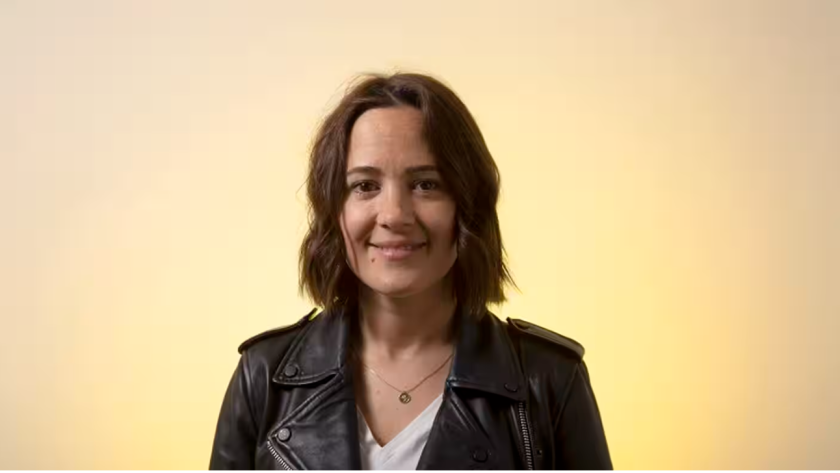Alexia Mihaila and Aryan Tauqeer from the UCL Film & TV Society Journal caught up with Rowan Woods, a key programmer at the BFI London Film Festival. Navigating through the unique challenges and opportunities of curating in the digital age, Rowan shares an insightful peek into the world of film programming and some behind-the-scenes anecdotes of London’s biggest film festival.
Rowan Woods is a seasoned film professional and an esteemed programmer at the BFI (British Film Institute) London Film Festival. With a background in film festivals, research, and production, Rowan has contributed significantly to the festival scene. Her experience includes working at the British Council, the East End Film Festival, and BBC Films, as well as serving as a radio and TV journalist at the BBC.
Shaping the Festival: Post-COVID Creative Impetus
ALEXIA: What was the creative impetus behind this year’s edition of LFF, in the context of this being the first fully post-COVID edition of the festival?
ROWAN WOODS: Well, it’s technically not the first fully post-COVID edition. I suppose we’ve been gradually creeping back, post-COVID so it’s maybe the second or third iteration of being able to actually have filmmakers back in person. Certainly, it’s been a process over the last couple of years. In terms of the creative shape and impetus of the program: every year we have a broad structure for the program, and every year we program into that structure. Hence, we have a Headline, Gala and Special Presentation tier, followed by a series of Competitions: a First Feature competition, a Main Competition, a Documentary Competition, Shorts Competition, and then the rest of the program is separated into thematic strands to help the audience navigate it. These include: Thrill, Dare, Love, Cult, Family, Journey, etc.
When we are putting the program together, we’re watching all of these amazing films from around the world, both at festivals and those films that are submitted to us directly. We’re thinking about whether we love the film, if there is an audience for it in London and if it fits into our festival structure. Even within structures, the texture and tone of the festival are different every year. We were really pleasantly surprised to find, after a couple of years of quite a lot of doom and gloom, that there’s quite a lot of comedy in this year’s festival, which is a real pleasure.
Unraveling Themes: The Art of Selection
ALEXIA: How do you decide on choosing the festival topics?
Rowan Woods: Well, we always have those thematic strands so that they are a constant. This particular program structure has existed maybe for about ten years or so. It was put in place by one of our previous artistic directors, Claire Stewart, and is one that we have sort of worked within and evolved over. In the last decade or so, the reason we have those different thematic strands is that we cover pretty much every tone and every different audience. interesting themes that come together as we start to view the whole program and we find these interesting similarities or thematic connections between the titles. So that’s one of the real pleasures of the job- that element of surprise and going where the filmmakers take us and interpreting what the program is telling us.
ARYAN: In terms of the programming of LFF titles: each year, when LFF is programmed , it acts as a reflection of sorts on the current British film scene. With regards to this year, how did the programming of this year’s edition of LFF reflect on the current British film scene, particularly in the case of independent cinema?
Rowan Woods: We always have a really strong selection of British work. That’s part of what the festival the festival does. We’re very well placed to find and nurture those voices- which was one of the most exciting things both this year, but also, I’d say, over the past five years, one of the most exciting stories has been new British voices.
With first and second features- we’ve got a couple of very strong second features in the program by directors who have had their first features at LFF over the last five years or so. They return, really stepping up with work that feels bigger, richer and and more mature. Amongst those titles, there’s a film called Eileen (2023) by a director called Will Oldroyd, who had his first feature, Lady Macbeth (2016), in the festival about 5 years ago; it was of one of Florence Pugh’s breakout films. It’s really exciting to see him working on a much bigger canvas with big stars like Anne Hathaway, and it’s based on a novel by Ottessa Moshfegh, who also wrote the script and adapted the book.
We’ve also got an incredible showcase of new talent with First first Features in the festival this year, great films like Horde, which was just played at Venice, Sky Peals (2023) played in Carla Vivari, Black Dog (2023), Bonus Track (2023). Even our opening and closing night films- Emerald Finnell’s Saltburn (2023) is a second feature by a British director, and our closing night film and The Kitchen (2023), is a first feature by Kibwe Tavares and Daniel Kaluuya.
Programming Highly Anticipated Titles: Strategy and Balance
ARYAN: In terms of the usual selection at LFF, the festival occurs months after other European festivals like Berlin, Cannes and Venice, and so resultantly often incorporate or select titles that have premiered at these festivals. This year, how did you as a programmer go about the process of programming highly anticipated titles from other European festivals, especially since so many that were delayed because of COVID, like Killers of the Flower Moon (2023) and Close Your Eyes (2023), have actually been released this year.
ROWAN WOODS: We’re at a really exciting point in the calendar year, in that we are able to, as you say, sort of take our pick of titles that have premiered. It’s Sundance, Berlin, Cannes and some of those summer festivals, and we also start to see some of those these sort of award-season titles coming through that tend to often premiere at places like Venice and Telluride and Toronto, but because we are still relatively early in in that awards season, we’re also a place where filmmakers want to world premiere their work for awards consideration.
We have a really lovely balance between absolutely brand new world premiere titles, and some of those most anticipated titles that have come from festivals earlier earlier in the year. As you say, Killers of the Flower Moon (2023) – we’re really excited to have that, and we have a very highly anticipated Martin Scorsese Screen talk to accompany it. It’s always a balance for us.
You could very easily, if you were so inclined, just replicate the whole of the Cannes program in London. Obviously, that’s not what we want to do. So it’s always about thinking “What titles have we seen that if really spoke to us from those earlier festivals?” Which titles do we think will really speak to a London audience, because ultimately, that’s who we are serving and what titles will help to shape the best texture of a program overall. We want to make sure that we have a really broad spread of genre- a global spread, you know, work from different countries, work from different voices, works in different registers and in different tones. So it’s always a real balancing act.
Of course, within the programming team, we all have different tastes which you know, which is really important. And we’ll all see things that you know, that we really really love and really, really want to champion and think that absolutely have to be in the program. Sometimes we all see the same film and have wildly different views on it; that’s also a really exciting part of part of the process.
Widening Access: Making Films Available to Diverse Audiences
ARYAN: in terms of programming a festival like LFF: part of it involves, I assume, not only programming titles that would draw a wide audience, but programming screenings that can accommodate as wide an audience as possible. I want to ask- especially considering the proliferation of virtual viewing platforms in a post- COVID era- what measures Is LFF taking this year, and plans to take in coming years, to widen access to screenings beyond the precedents already established?
ROWAN WOODS: I think this falls into several different parts to this question. I think one is about the work that we program so that with the titles that we select, we are making sure that we are thinking about lots of different audiences, different demographics, people with different tastes, different interests. We’re lucky enough to be programming into an audience that sits within one of the most diverse and exciting cities in the world, and there are lots of people from different backgrounds, different communities, different tastes, different interests, and we think about that very carefully when we’re selecting selecting the program.
Then the other part to the question and consideration is about how we actually make those films available to audiences once we’ve selected them. One of the big things that we are doing this year- that in fact, we’ve been doing for the last couple of years- is making the program available outside of London. Of course, we’re the London Film Festival, but we’re also trying to make sure that we serve an audience all all around the country. A selection of work from the program, some of the really big gala titles, but also some of these hidden gems across the wider program will play at about nine or ten cinemas in key independent cinemas regionally around around the country to make the festival feel really accessible. We also have a program of work called LFF for Free, which is a series of talks, panels, club nights, screenings, quizzes exhibitions, all kinds of activity, that is, you know as the title implies, free, and that’s about finding a way to draw in an audience who- let’s be honest, if you’re buying tickets for even ten titles, it ends up being quite expensive. This is about finding ways to engage with the festival, be part of that conversation, be part of that that community, and the really exciting sense of of buzz and occasion that happens around the festival without it being financially unmanageable.
ALEXIA: When it comes to curating titles in the Official Competition trend, how do programmers like yourself undertake the process of narrowing them down to a limited selection?
ROWAN WOODS: It’s one of the best but also the hardest and most heartbreaking parts of the job, because, for example, with the Offficial Competition selection, we have a limited number number of slots, and there are so many films that we see each year that are deserving of being in those slots. For us, it’s always about the criteria, which almost tends to come into focus once we’ve started to see everything. On a more practical, prosaic level we’re also thinking “Where else could this particular film sit? Has it got a very high profile cast, is it therefore a title that actually could play in the Royal Festival Hall? In that case, is it better suited to being part of Special Presentation or a gala title?”.
Those are some of the practical questions that we have, and then, of course, with the Official Competition or any of the competitions we are thinking about, again, the overall spread and the texture. We want to make sure that we have a variety of different of different voices, different tones, work that’s coming from different parts of the world.
That’s why sometimes a title that we really really love and think deserves to be in competition may not end up being in competition, because there’s something else in there. If we have two post-colonial dramas from a certain part of the world, you probably don’t want to put them both in the same in the same section, because they’re doing something that’s quite similar. Hence, you probably separate them. In that case, one of them probably doesn’t end up in in competition. It’s always a combination of really creative, curatorial and artistic responses to the work, as well as quite practical questions.
Behind the Scenes of Official Competitions
ALEXIA: How long does it take to go through all the submissions?
ROWAN WOODS: [laughs] Oh, my God! So long! The process starts- the festival always happens in the first couple of weeks in October- so this year, it’s the 4th to the 15th of October- and our programming process starts in January. That’s when we start to first watch films that are playing in Sundance, that are going to be in Berlin. We tend to start getting our submissions coming in usually around Easter- between Easter and the beginning of June, and during that time, as the submissions come in, we are all watching them. We also have some external program advisers who help to watch all of those submissions as well, because it’s far too many for just the core five staff programmers to to watch. But I’d say, for the programming team between March and mid-July: we are doing an awful lot of viewing, usually 5 to 6 films a day, 7 days a week. it’s a lot so but it’s also a real pleasure and a privilege.
ARYAN: At LFF, every year has a Surprise Film. Even when I’ve gone to other European festivals, I think the Suprise Film at LFF is something that really, in terms of creating an audience experience, distinguishes it from other festivals. How does you know a programmer like yourself go about selecting what I’m sure is an enormous list of titles that could potentially be there for a surprise film.
ROWAN WOODS: I thought you were going to ask me what it was [laughs] because I can’t tell you. Mostly because I don’t know. Usually this is a very, very secretive process. It’s like choosing the Pope- it’s all done behind closed doors, and it’s usually only the festival director who knows. I have no idea, my colleagues have no idea.
One of our favorite games to play both within the programming team but also between me and my friends who don’t work at the festival but have been attending for years, is always to guess what’s what the Surprise Film might be, and of course, you know sometimes there are big titles that have played at other festivals that are conspicuous by their absence. Sometimes there will be a good reason why we didn’t program it. Perhaps we didn’t get to see it in time, perhaps it wasn’t finished in time, you know. Other reasons why include maybe the talent weren’t available to attend. Hence, it might end up being in the surprise slot for all kinds of reasons that I couldn’t possibly comment. It’s a very, very secret process, and I’m as excited as you are to to find out what it’s going to be this year.
Rapid Fire Questions: A Glimpse into Rowan’s Film Preferences
ALEXIA: What film are you most excited to see?
ROWAN WOODS: Well, obviously Killers of the Flower Moon (2023). I haven’t seen that yet. That’s one where I’m gonna get up and go very early on Saturday to the press screening at like 8 o’clock in the morning, and that’s gonna be my one treat during during the festival. I’m also very excited to see Maestro (2023), which I haven’t seen yet- the Bradley Cooper film which has just had ecstatic reviews from the New York Film Festival last night.
ALEXIA: What about your favorite British TV series ever?
ROWAN WOODS: Right now I’m gonna say, my two favorite British series are, of course, the two British series that we have in the LFF lineup. So that is Grime Kids (2023), which is our Series Special Representation this year, which is about the birth of grime music in East London, so it’s a very, very London story, and it’s set in 2001 and the soundtrack and the clothing choices -if you were around, and remember that moment- feels very, very evocative of a particular time and place; it’s written and show-run by Theresa Ikoko, who wrote the film Rocks (2019), which was at the festival a couple of years ago. We also have another series in the festival lin up this year: a British series called Culprits (2023), by J Blakeson, who is the director and writer of I Care A Lot a couple (2020). But I would say, possibly my favorite British series of all time is maybe Happy Valley (2014). I think it’s an absolute masterpiece.
ALEXIA: What advice you have for people starting out- students or anyone creative- in the industry?
ROWAN WOODS: I’d say specifically, my big piece of advice is always to watch as much as you can. Whether you want to be a screenwriter, a journalist, a director, a producer… whatever it is that you think you might want to do in the industry. The best thing that you can do is watch as much as you possibly can: new things that are coming out, but also classics. Your students will have and are lucky enough to be in the same city as the year-round BFI Southbankprogram, where there is always a wonderful selection of classics and a way of sort of learning and understanding the canon there. The festival also has a load of really great remasters and restored classic titles.
But I’d say, you know, in the spirit of trying to see as much as you can, the festival is a really great place to start. I don’t want to tell everyone to go to the Martin Scorsese Screen Talk, but I’m sure the queue to get into that is going to be round the block of people just turning up and seeing, if there might be spare tickets on the day. So it is always worth trying to do that with them, with things that you want to want to get into, and then also taking a chance on those things that you may not get to see otherwise. You may follow your passions and your excitements, and if you’re particularly into coming of age films, or you’re if you’re particularly into films from Argentina, or wherever it happens to be, the festival is a really wonderful way of chasing those enthusiasms. I’ll be queuing for the Martin Scorsese Screen Talk!
ALEXIA: I think that’s such a great advice! We actually got tickets for that already, so we’re definitely going.
ROWAN WOODS: You better make sure no one tries to mug you and steal those golden tickets [laughs]. That’s also good advice, you know- don’t tell anyone you have those tickets, not even me. I just keep that very, very quiet.




